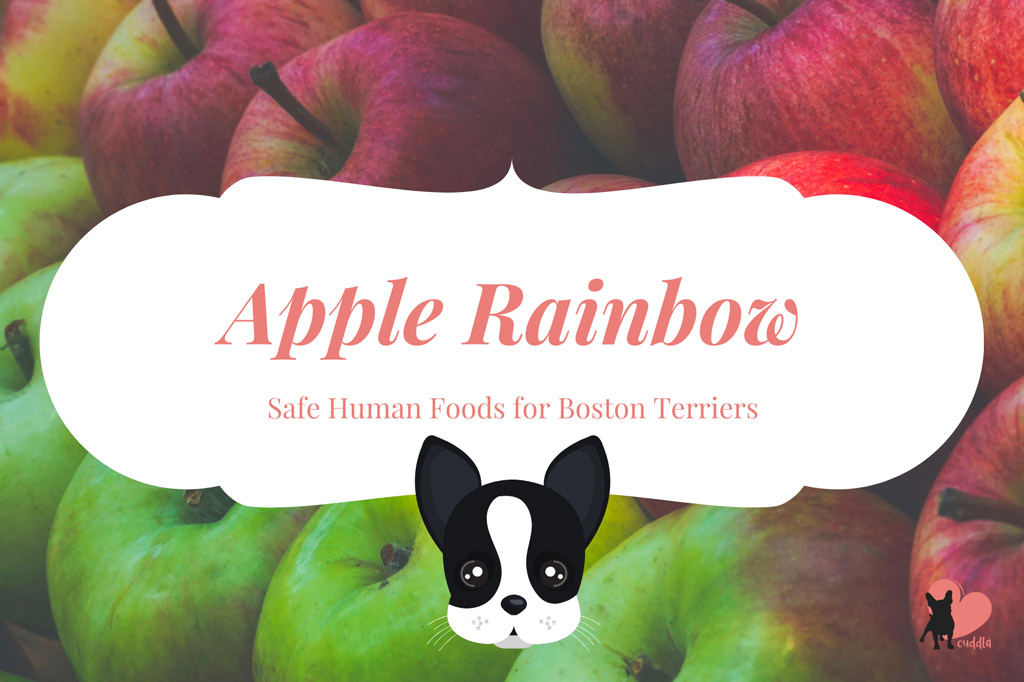
Dogs metabolize foods differently from humans. That’s why it’s good to know which foods are safe for your Boston.
Can a Boston Terrier eat apples? Yes, dogs, including Boston Terriers, can eat apples in moderation. This fruit is a great source of vitamins A and C. However, don’t feed your dog the core and seeds of an apple.
Discover why apples can be good for your dog, how to feed them to your pooch and how to make a tasty fermented treat!
Also, find out what other human foods you can feed your Boston Terrier. 🙂

Can a Boston Terrier Eat Apples?
Apples can be an affordable treat that is full of valuable nutrients for dogs. That’s why they can be a great choice as a reward during training.
Benefits of apples for dogs:
- Source of vitamins A, C and K.
- Source of calcium and phosphorus.
- Contain antioxidants – good for warding off cancer and reducing the symptoms of joint disease and ageing.
- High in dietary fibre – good for digestive health.
- Low in calories (source).
- Freshen up doggy breath and help with dental hygiene.
Boston Terriers can eat apples as long as they are served in moderation. Apart from having nutritional properties for dogs, apples can “also” be dangerous for your dog’s health.
Here are some dangers of feeding apples to your dog:
- They contain sugar (fructose, to be precise) – this can cause problems for dogs who suffer from cancer or diabetes.
- Too many apples can cause an upset stomach or diarrhoea.
- Your Boston Terrier could be allergic – signs of an allergic reaction in dogs includes coughing, sneezing, swelling, hives, and difficulty breathing.
- Apple cores and seeds are dangerous (refer to Can a Boston Terrier Eat Apple Cores? section below).
Especially if in doubt, you should always ask your veterinarian before giving your Boston Terrier any human food, including apples.
Insider Tip: Some dogs have medical conditions that may be worsened by consuming apples.
Disclaimer:

I am not a veterinarian, so always check with your vet before changing your Boston Terrier’s diet to avoid unexpected consequences.
However, I do have knowledge on dog nutrition and dietary needs.
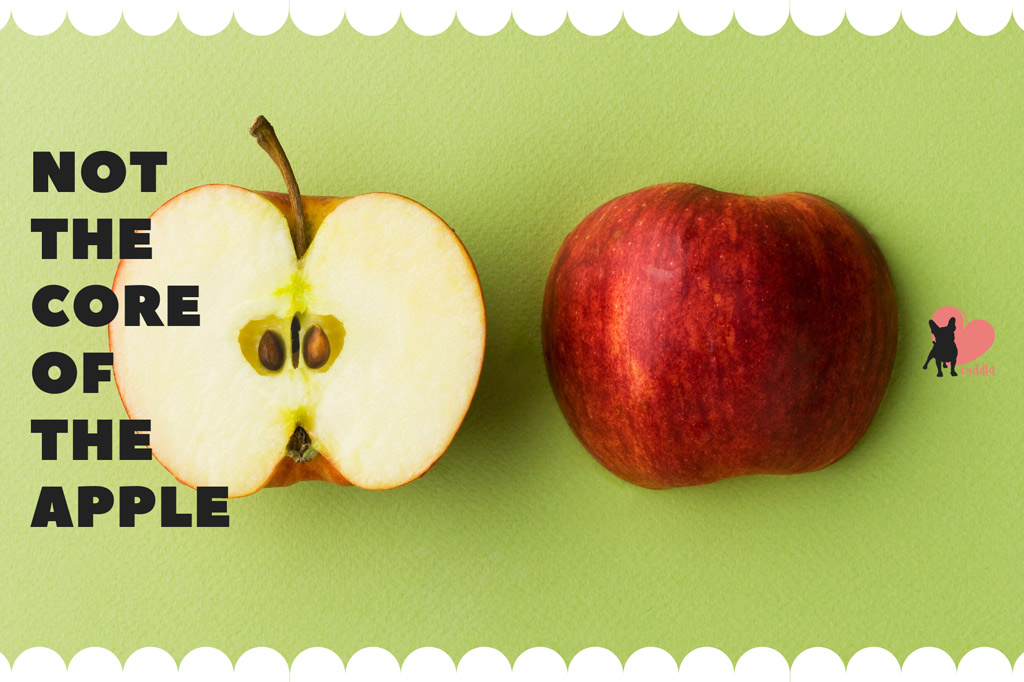
Can a Boston Terrier Eat Apple Cores?
Apples are full of nutrients that can be beneficial to your Boston Terrier’s health. But there are some dangers to look out for, such as the core and seeds of an apple.
Boston Terriers shouldn’t eat apple cores and seeds. The two main reasons are:
- The tough centre of an apple is a choking hazard or, if swallowed, can cause a gastrointestinal blockage.
- The seeds contain low amounts of cyanide, which is toxic and over time builds up in the system.
Note: The cyanide found in apple seeds isn’t dangerous when eating a single apple. However, the poison accumulates over time if your dog continues to ingest the seeds.
If your Boston has eaten an apple core and doesn’t appear to be having any trouble, there’s no reason to immediately worry. Keep an eye out for any signs of digestive blockage and call your vet if you notice anything.
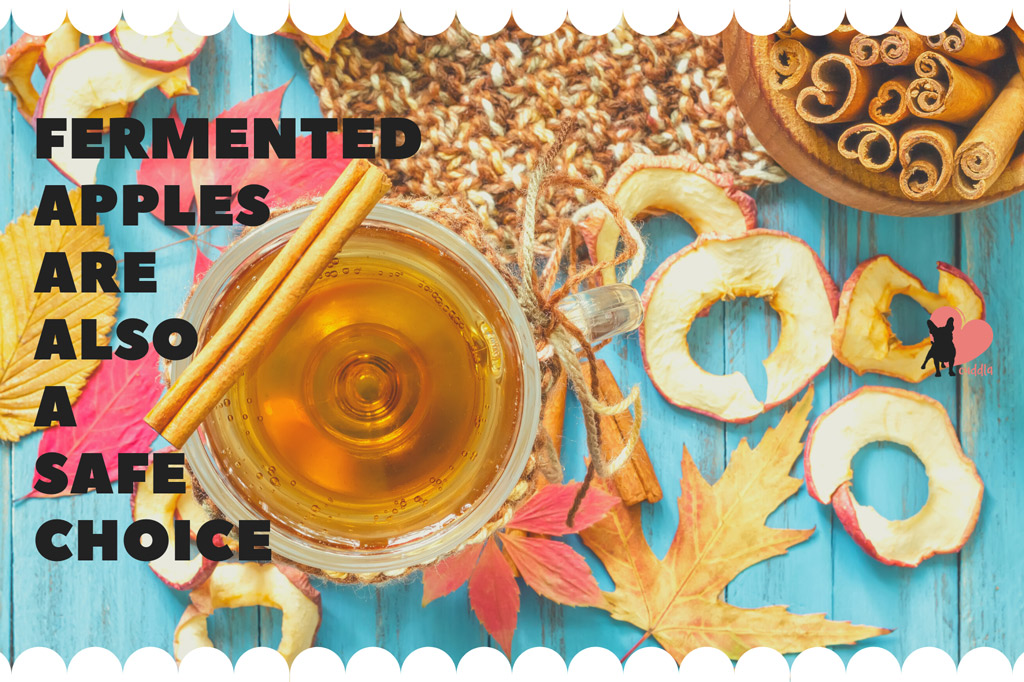
Can a Boston Terrier Eat Fermented Apples?
Fermented apples are more digestible and your Boston Terrier gets more nutrition out of them than he would out of the same unfermented apple.
Also, fermented fruits and veggies are full of probiotics. These help to restore your dog’s gut bacteria balance especially after he’s been given antibiotics.
Insider Tip: Your dog’s ability to fight disease is mostly located in his gut.
Apart from protecting your Boston Terrier from disease, fermented foods also help your pooch to detox. i.e., they help to get rid off heavy metals and toxins that build up in your dog’s body over time like:
- Lawn pesticides.
- Pollution.
- Cleaning chemicals.
- Vaccines.
- Medication, including antibiotics.
- Even dog food and water!
Although apples and fermented apples can be good for your Boston, apple-flavoured products or products that contain apples are not.
These often have added sugar, artificial flavours, and/or chemicals in them, which are harmful to your dog.
Continue reading for a Fermented Apple Treat Recipe.
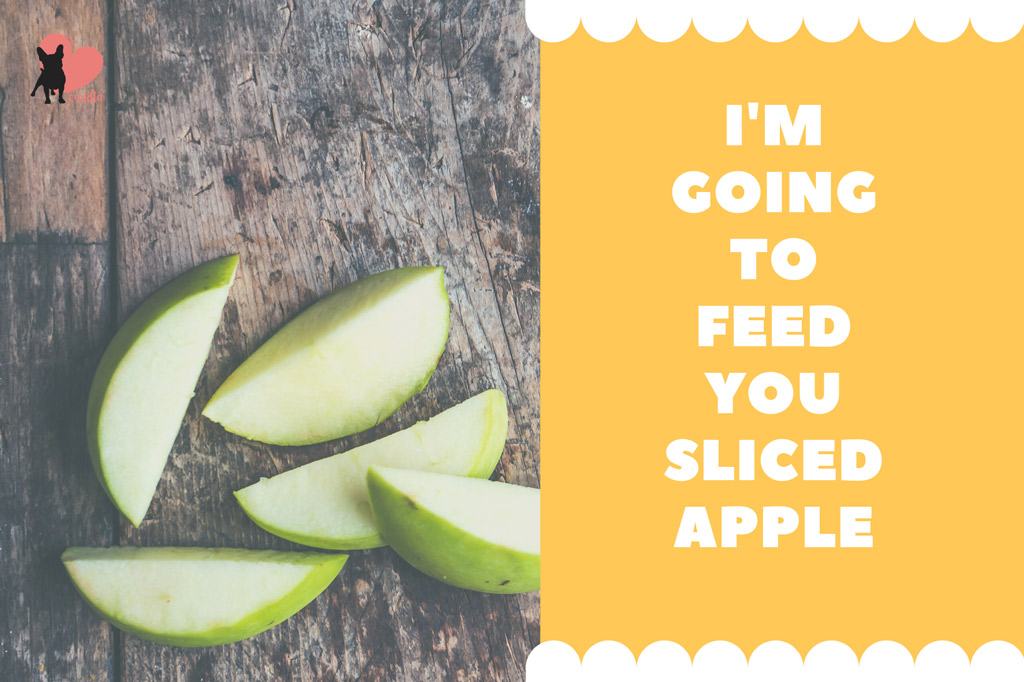
How to Feed Apples to Your Boston Terrier
How should you feed apples to your dog?
After checking with your vet, introduce apples into your Boston Terrier’s diet gradually. This will help to overrule allergies and evaluate how your Boston reacts to a new food type in his diet. Always serve them in moderation as a treat or add it to your dog’s usual meal.
You can feed your pooch the same types of apples you like to eat.
Just make sure that you choose organic apples to avoid pesticides and other substances. For example, supermarket apples are coated with substances that make them shinier.
Here’s how to feed an apple to your Boston Terrier:
- Wash the apple because it can contain herbicides or pesticides.
- Remove the core, seeds and stem.
- Slice the apple into bite-sized chunks before serving.
- Offer a small slice of apple to your Boston Terrier and see how he reacts.
Most dogs love the sweet taste and crunchy bite. Green apples are a little sourer than red apples. But regardless of the variety, they offer the same benefits nonetheless.
There are plenty of ways to serve apples to dogs:
- You can freeze and serve them as a refreshing summer snack.
- Alternatively, mix apple slices or fermented apples in your dog’s meal.
- They can be smashed or blended into homemade applesauce.
- You can make fermented apples and serve them as a treat with some kefir.
- Wholesome Pride Apple Slices single ingredient dog treats.
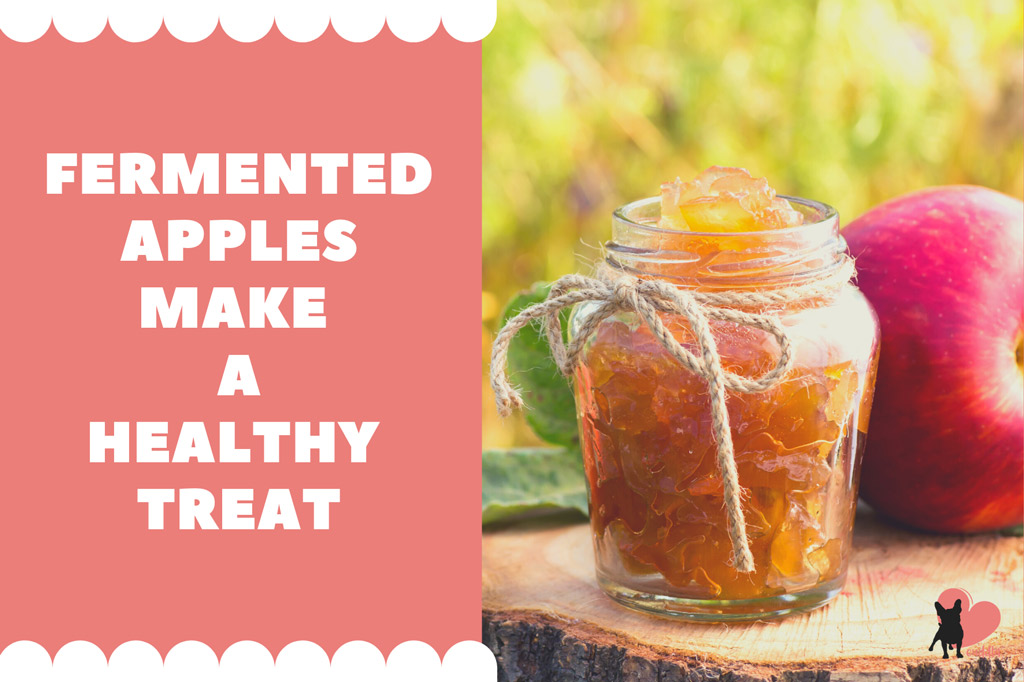
Fermented Apple Treat Recipe
Here’s how to make fermented apples at home. Follow this recipe to fill a mason jar of fermented apples.
Ingredients:
- 3 medium-sized organic sweet apples.
- 1 lemon juice
- 1 tablespoon of sea salt (I prefer Himalayan pink salt).
- 4 cups of filtered water.
What you’ll need (utilities):
- A cup or bowl for the squeezed lemon juice and grated lemon skin.
- A plate or bowl for the sliced apples.
- A pot.
- A jar for storage and fermentation.
- Cheesecloth or coffee filter.
Directions:
- Wash the apples thoroughly with water and dry them.
- Slice the tops off (remove the stems).
- Also, remove the core and the seeds.
- Slice the apples into small pieces.
- After, squeeze the lemon to get the juice.
- Pour the filtered water into a pot. Then, add the salt and the lemon juice.
- Heat the pot over, in medium temperature, until it’s almost simmering. Stir with a spoon to make sure the salt is dissolved.
- Place the apple pieces in the jar.
- Pour the filtered water mixture into the jar until the apples are covered.
- Close the jar and cover it with cheesecloth or a coffee filter.
- Store the jar at room temperature and allow it to ferment for 3 to 4 days.
- Check the apples for fermentation. The brine should be bubbling.
- You can taste the apples, they should be sweet with just a little bit of tang. If you think they are not yet fermented, leave them for another day or two and try them again. The longer they’re left at room temperature, the more tart they will be.
- Once the apples are fermented, put them in the fridge. They can last for 3 months in the fridge – the cold temperature will stop the fermenting process.
Serving:
I recommend introducing the fermented apples slowly to your dog.
You can start with a small amount, and gradually build up to 1 to 2 teaspoons per 20 pounds (9kg) of body weight per day.
However, I wouldn’t feed apples or fermented apples daily because I think it is too much for a balanced canine diet as generally, a Boston Terrier’s diet should be higher in protein than anything else.
Always check with your vet when introducing new foods.
10 Other Safe Human Foods for Boston Terriers
Can Boston Terriers eat human food?
It depends on the food. There are many human foods that are perfectly safe and even healthy for dogs to eat as an occasional treat.
Here is a list of 10 human foods to share with your Boston Terrier:
- Berries (Blueberries – SUPERFOOD).
- Bananas.
- Watermelon.
- Carrots.
- Eggs.
- Sweet potatoes.
- Pumpkin (Pumpkin seeds – SUPERFOOD).
- Broccoli.
- Fish like sardines and salmon.
- Coconut oil (MCT – SUPERFOOD).
Dogs not only can eat these foods, but they also can benefit from their nutrients and healthy properties (source).
P.S. Get familiar with harmful foods at 10 Toxic Human Foods for Dogs list.
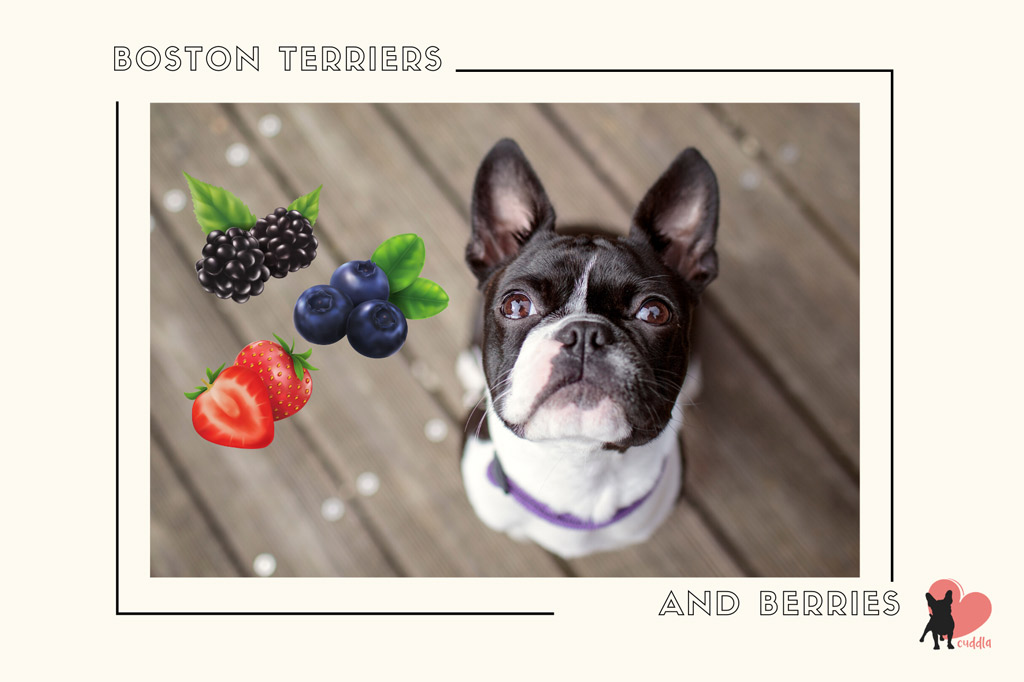
#1 – Berries
There are three types of berries that dogs can eat:
Strawberries
Can Boston Terriers eat strawberries?
Yes, your dog can safely eat them in moderation. Strawberries make a healthy treat for dogs, as they are:
- High in nutrients like antioxidants and fibre.
- Low in calories. (source)
Before feeding your Boston strawberries, make sure to cut them into small chunks to prevent choking.
Blackberries
Fresh or frozen blackberries are safe for your pooch (source).
They are:
- Rich in vitamins.
- High in minerals and antioxidants.
- Source of fibre.
- Low in calories.
Blueberries
Can a Boston Terrier eat blueberries?
Yes, blueberries are also safe and nutritious for your Boston to eat.
Blueberries are:
- Rich disease-fighting antioxidants (vitamins A, C and E are all antioxidants and so are minerals like magnesium).
- Have a significant amount of vitamins (A, C, E, K, folate and choline)
- Rich in minerals like potassium, phosphorus and magnesium.
- High in fibre.
- Low in calories. (source)
Insider Tip: Blueberries have the highest amount of antioxidants of any fruit around. Also, they are quite low in sugar compared to other fruits.
Remember that antioxidants are known to slow the ageing process and boost your dog’s immune system.
Apart from being nutritious, blueberries also provide health benefits to dogs, such as:
- Help fight cancer – reduce cancer cells growth.
- Support brain health – slowing ageing and cognitive problems.
- Reduce inflammation.
- Improve heart health by strengthening vascular functions.
- Manage obesity – limit weight gain and help lose it too.
- Boost gut health – build the gut microbiome (the good bacteria) and heal the gut.
- Manage urinary tract health by preventing bacterial infections.
- Preserve eye health by slowing age-related eye problems.
- Recover from exercise – reduce oxidative stress and muscle damage. (source)
Plus, their small size makes them an excellent health-conscious treat for your Boston Terrier. Just don’t overdo it.
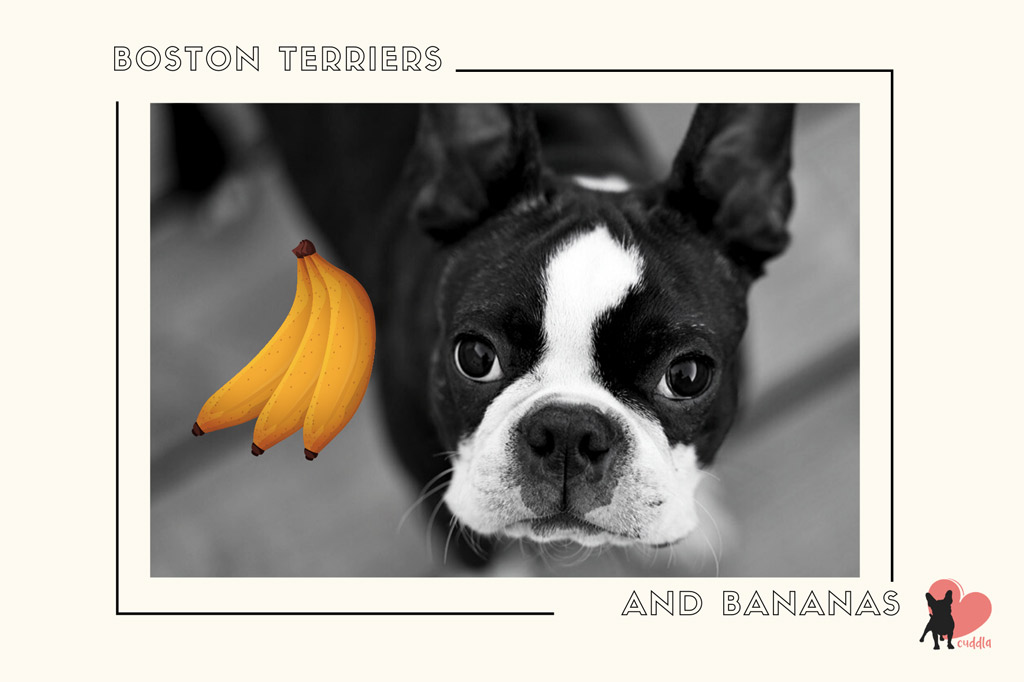
#2 – Bananas
Can dogs eat bananas? Yes, but in moderation.
Bananas have major health benefits for dogs:
- High in fibre.
- Source of minerals like potassium and manganese.
- High in vitamins C and B6 (source).
But they also contain sugar in the form of fructose, like all fruits. Bananas have a GI index of 51, which is considered medium.
Note: The glycemic index is based on a scale of how quickly a food causes blood sugar levels to increase.
You can mix some mashed banana in your dog’s meal or feed him a small slice as an occasional treat. Alternatively, try this dehydrated banana dog treat: Wholesome Pride Banana Bites.
Read also: Can a Boston Terrier Eat Bananas? 6 Things to Know blog post.
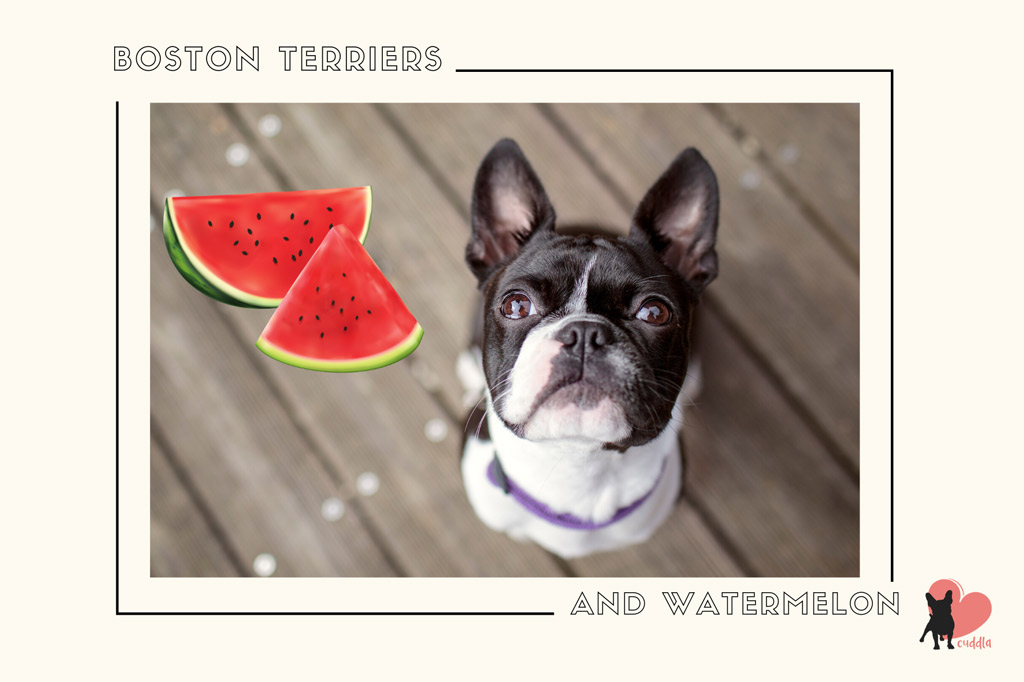
#3 – Watermelon
Can Boston Terriers eat watermelon?
Yes, watermelon is safe for dogs. However, don’t give your dog the rind or the seeds, which could be a choking hazard.
Watermelon is healthy food in moderation since they are:
- Packed with micronutrients, such as potassium, vitamin A and vitamin C.
- Low in calories (source).
Note: Fruits do have natural sugar (fructose) in them, which can be harmful to your pooch in high or frequent quantities. Watermelon has a GI index of 76, which is considered high.
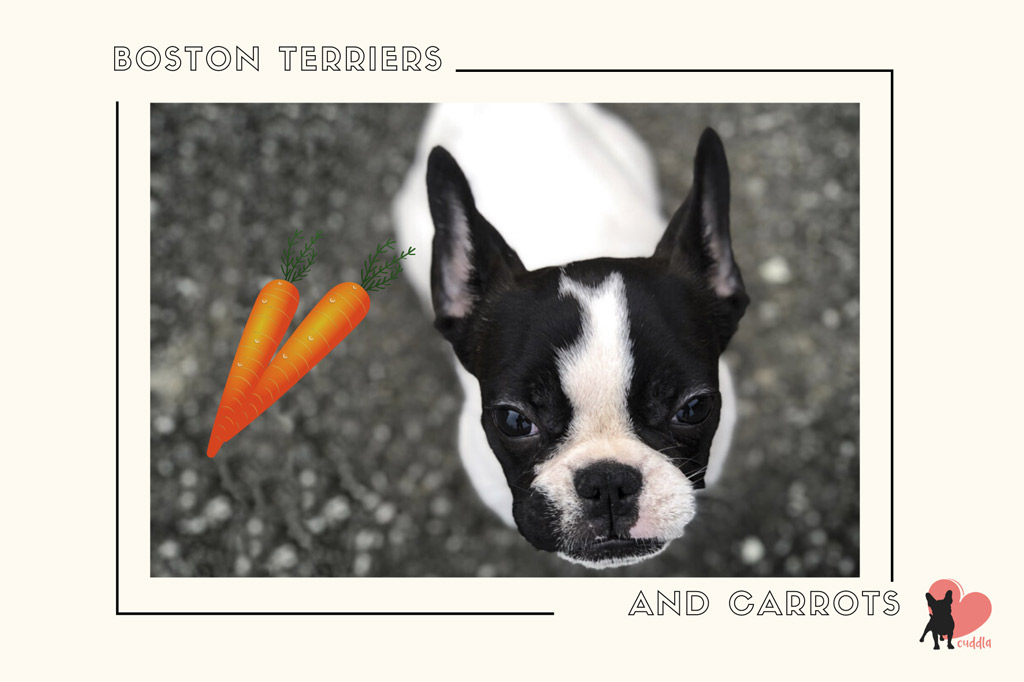
#4 – Carrots
Can Boston Terriers eat carrots?
Both raw and cooked carrots are safe for your pooch to eat. Alternatively, you can try dried carrots like Wholesome Pride Carrot Slices dog treats.
Carrots are:
- High in fibre.
- A source of vitamins and minerals.
- Low in calories (source).
Note: Dogs don’t digest raw carrots very well, so it’s better to boil them lightly and serve cooked.
Like with most foods, before feeding carrots to your Boston Terrier, make sure to cut them into bite-size pieces to prevent choking.
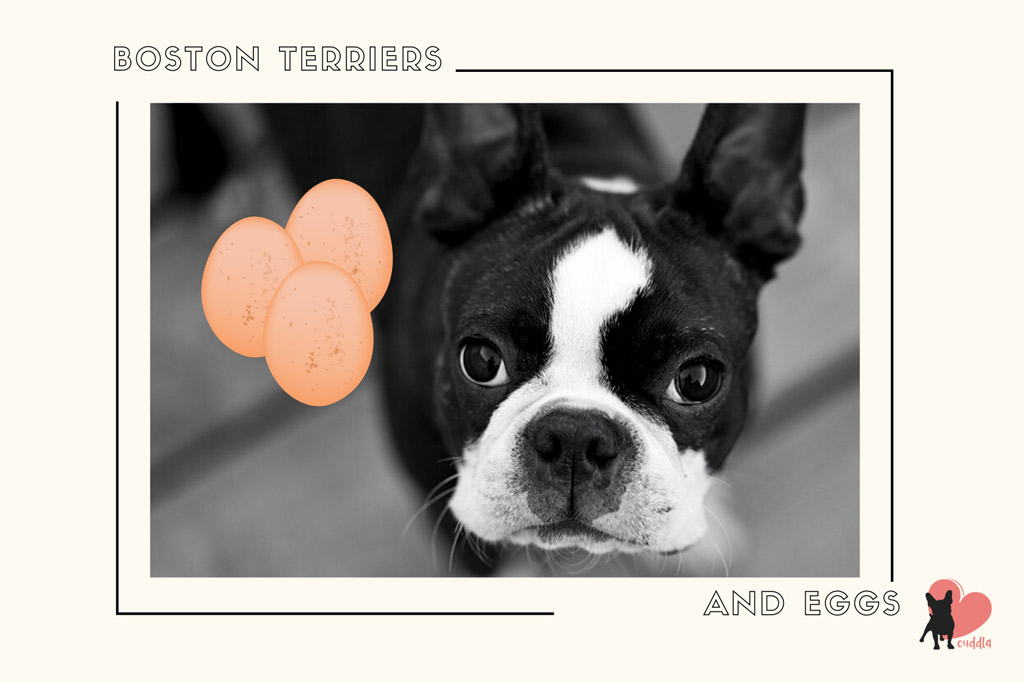
#5 – Eggs
Can a Boston Terrier eat eggs? Boiled or Raw?
Both! ideally, you want to feed your dog eggs from organic and free-range.
Eggs are a good source of:
- Protein.
- Iron.
- Vitamin A and B12.
- Fatty acids.
- Selenium (source).
Raw eggs provide higher benefits than cooked eggs. Cooking eggs reduces and devaluates the nutrients, so it’s best to serve them up raw.
Note: Although dogs handle the bacteria in raw foods… Salmonella can spread if you don’t clean your hands and your dog’s feeding bowl when handling raw eggs.
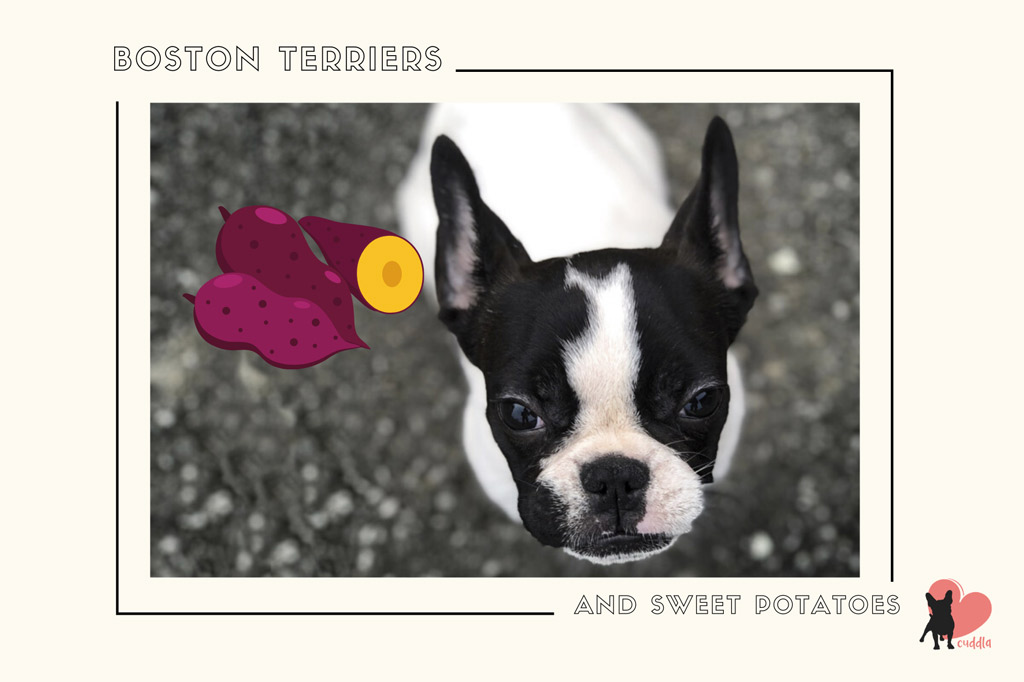
#6 – Sweet Potatoes
Sweet potatoes are a common ingredient in healthy dog food and treats. But they can also be a single ingredient treat like Wholesome Pride Sweet Potato Chews.
But, can dogs eat sweet potatoes?
Yes, they are a safe ingredient in moderate amounts.
Sweet potatoes are rich in:
- Vitamin A, which is important for your dog’s eye health and immune system.
- Minerals like manganese (source).
However, sweet potatoes pose three problems:
- A higher amount of sugar. This starchy carbohydrate will spike blood sugar in your Boston Terrier when he eats them.
- A growth of bad bacteria and yeast in your dog’s gut. This can lead to itching.
- Bone problems and muscle weakness in dogs due to an excess of vitamin A. Another reason not to feed big amounts of sweet potatoes.
Insider Tip: Serving sweet potatoes boiled or baked increases their glycemic index (the sugar levels).
Boiled sweet potatoes have a GI index of 63, in contrast, boiled white potatoes have a GI index of 78.
Baked sweet potatoes have a GI index of 64, but dehydrated and raw sweet potato has a low glycemic index value of 41.
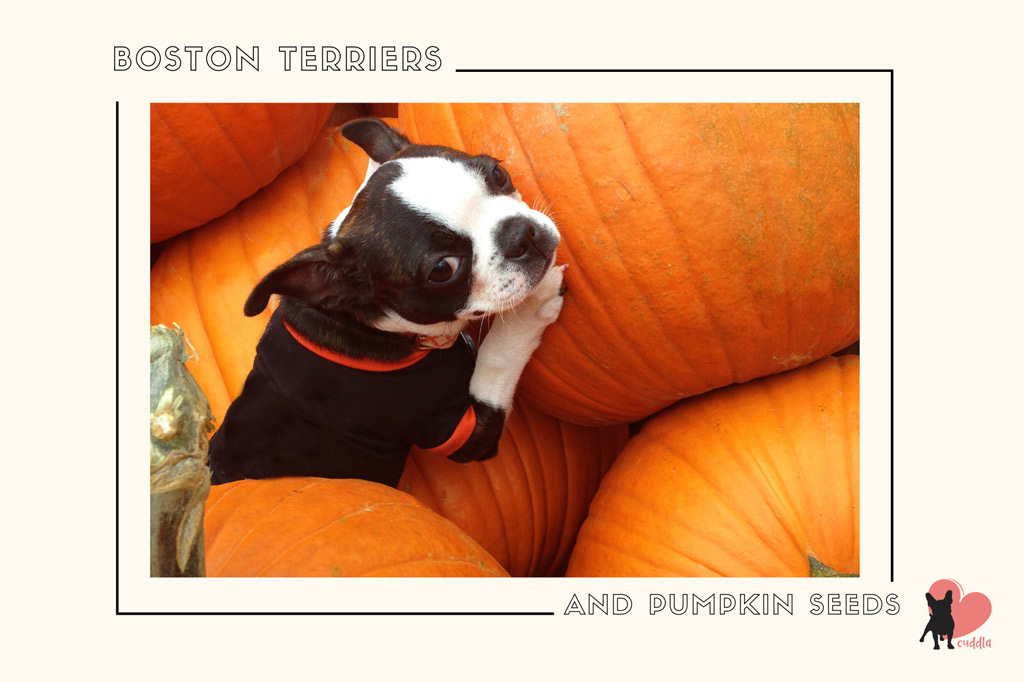
#7 – Pumpkin
Can dogs eat pumpkin?
Yes, pumpkin and other winter squashes are a good source of fibre and beta-carotene. Also, pumpkins are good for both diarrhoea and constipation.
In terms of quantity, puppies and small dogs like Boston Terriers only need one or two teaspoons once a week.
Also, you can give your pooch a pumpkin treat like Wholesome Pride Pumpkin Strips – single ingredient (dried pumpkin).
And what about the seeds? Can dogs eat pumpkin seeds?
Raw, organic pumpkin seeds work as an effective deworming agent against tapeworms and other intestinal parasites in dogs and humans.
So, they are a natural dewormer!
Pumpkin seeds are a:
- Rich source of protein (93%), vitamin B12 and manganese.
- Good source of phosphorus, potassium, zinc, copper and selenium (source).
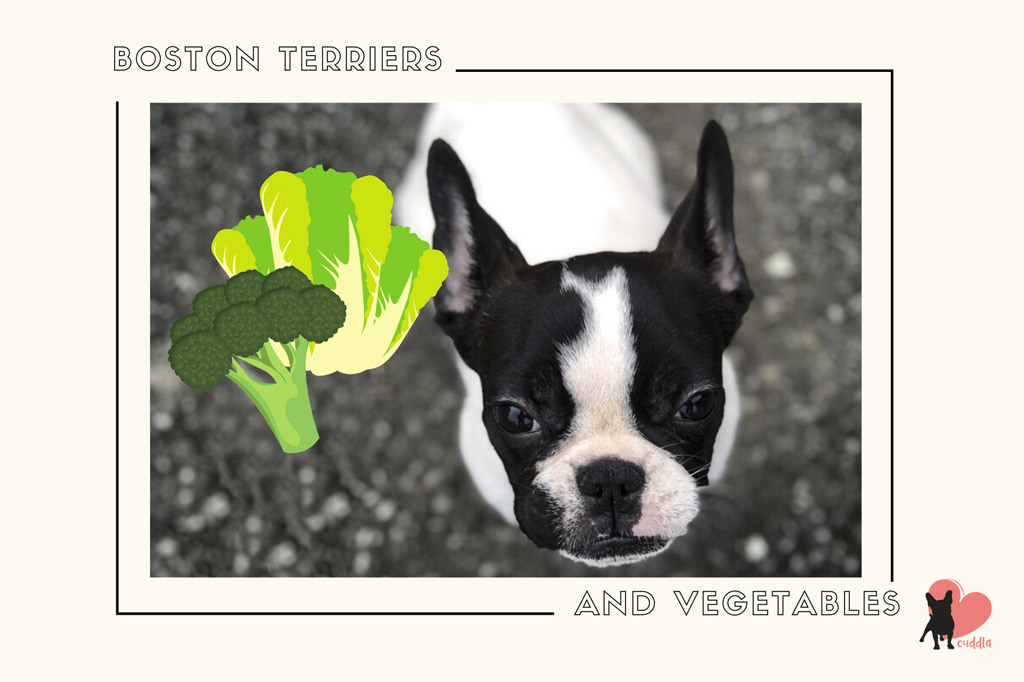
#8 – Broccoli
Can dogs eat vegetables?
Few fresh-cut veggies mimic the prey’s stomach contents. But which ones have high nutritional properties for dogs?
Dogs can eat raw or cooked broccoli. This vegetable contains high amounts of many nutrients:
- Vitamins A, C, and K.
- Source of minerals and fibre.
- Low in calories (source).
Note: Broccoli contains isothiocyanates, which are compounds that may irritate your dog’s digestive system if he eats too much.
Broccoli can be a very healthy snack or an ingredient in your Boston’s meal when served in moderation.
Other good veggies are kale and fermented cabbage (sauerkraut).
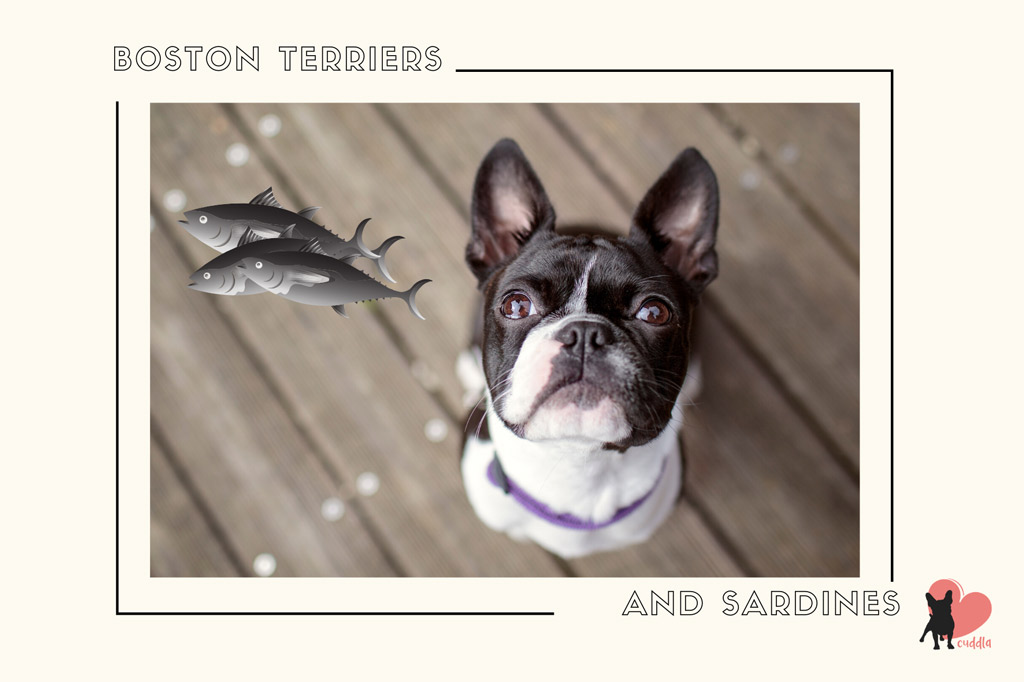
#9 – Fish like Sardines and Salmon
Can dogs eat fish?
It depends on the fish. Sardines, for instance, are a safe choice for dogs, as they are:
- High in protein.
- Good source of fat (omega-3 fatty acids), which support the immune system and are beneficial to skin health.
- Low in mercury (due to being a small fish).
Can Boston Terriers eat salmon?
Other good fish choices for Boston Terriers include salmon (cooked and boneless) and fish oil like krill oil (source).
Both are a great source of omega-3 fatty acids, which are known to reduce inflammation and may help keep your dog’s skin and fur healthy.
Note: Don’t feed raw fish to your Boston Terrier. This warning includes raw salmon, which has a parasite known to cause salmon poisoning disease.
Insider Tip: Bigger fish will have more toxins (like mercury) in their bodies than the plant-eating fish at the bottom of the food chain.
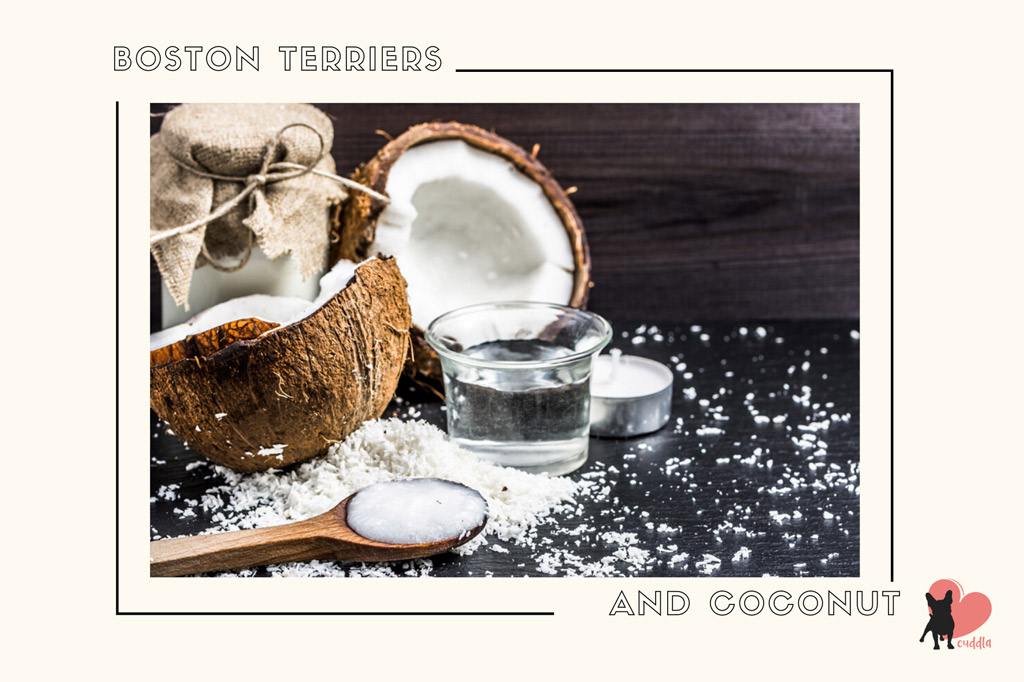
#10 – Coconut Oil
Coconut is safe for dogs to eat in moderation. Make sure is an organic and raw source like Coconut Merchant Coconut Oil.
Coconuts are high in fat and calories. But, coconut oil contains MCTs which are highly beneficial (source).
MCT provides many health benefits for dogs when ingested. MCTs can:
- Improve brain function (study), preventing dementia.
- Reduce inflammation.
- Improve digestion and nutrient absorption.
- Reduce the number and severity of seizures.
- Help with weight loss.
- Lower blood sugar levels.
- Improve gut health (research study), stopping the growth of yeast in the gut. You can use coconut oil for dog allergies!
Note: Coconut oil, however, can cause high cholesterol and weight gain in dogs.
When giving your Boston Terrier coconut oil daily or every few days, give him up to 1 teaspoon per 10 pounds (4.5kg) of body weight. However, you should start at just 1/4 of that amount and gradually increase to 1tsp to avoid loose stools.
External uses of coconut oil have many benefits too:
- Treat skin condition as dry skin and eczema thanks to the antimicrobial and antibacterial properties.
- Hydrate and nourish your Boston Terrier’s skin, making your dog’s fur shinier and less prone to damage.
- Prevent dogs from being infected by ectoparasites, such as ticks, fleas, and mange mites thanks to the antimicrobial effects of coconut oil.
For external purposes, use a fractionated coconut oil like Majestic Pure Coconut Oil.
P.S. For more safe and healthy rewards, check Boston Terrier Treats blog post, which includes raw, single-ingredient and commercial options.

thank you!!!
Your post is vey informative about Boston Terriers' food. Dogs can eat apples in moderation, including Boston Terriers. Vitamins A and C are abundant in this fruit. Apple starch and seeds, on the other hand, should not be fed to your dog.